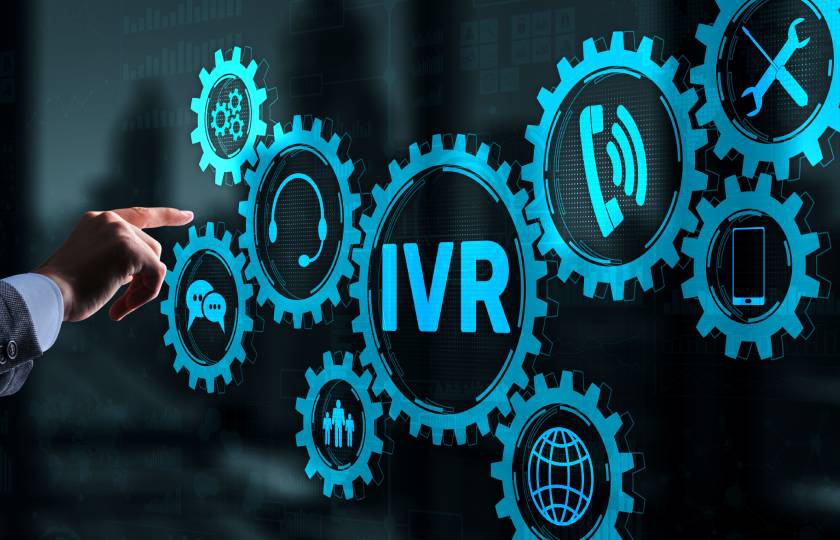
IVR (interactive voice response) in call centers can benefit any organization in a variety of ways. When your company may not have the resources to handle all of these incoming calls on its own, the ability to manage your call volume is a major benefit. You can perform at the level of a larger business without incurring the high expenditures associated with a larger workforce thanks to call center IVR.
We’ll talk about how IVR can help your call center in this article.

What is an IVR in a call center?
Your call center’s virtual receptionist is an IVR (interactive voice response) technology. Through interactive menus, it engages with callers and collects the essential information, including caller intent. After analyzing the data, the IVR system connects the caller with the agent who can best meet their needs.
Business organizations in any sector can benefit from IVR technology. Call centers frequently use IVR systems since they are inundated with a large number of calls. These solutions provide capabilities that help improve self-service options, improve customer satisfaction, and boost call center efficiency.
IVR functionality for call centers
A call center IVR solution should have the following features:
- Automatic speech recognition (ASR) technology built-in – This technology can recognize and process words said by callers in real-time. Even better, a complete transcript of the conversation can be produced by translating the speech into text.
- Callers have the ability to request a callback from a representative at the given phone number when their position in line is reached by using the queue callback feature.
- Skills-based routing – With this function, your company may route callers to the most qualified call center representative for their enquiry.
- IVR systems need scripts to work from so they can know how to engage with callers. An intuitive script designer can create these scripts. You can write that precise script thanks to this feature.
- Ring groups – You can answer an incoming call on any telephone system inside a given group by using a ring group.
The way a company employs these various IVR systems is the only real distinction between them. IVR solutions are frequently used to support agents in managing their call volume and to guarantee that customers have a reliable self-service option. IVRs are frequently used in various industries for the same purpose, although they may also be used for other purposes. Saving money on operational expenses is one possibility, since an IVR can take the place of a human receptionist.
IVR in a Call Center Use Cases
An omnichannel IVR system has the following call features. Here is how using them will help your company.
Routing based on skills – Your team can use a variety of routing techniques to disperse call flows optimally. However, one of the best options you can pursue is skills-based routing, which an IVR system may offer.

An improvement over an automatic call distributor (ACD) By utilizing this tool, you may direct calls to the appropriate agents based on criteria like particular languages, the time of day, or an agent’s level of expertise. Your caller will be transferred to voicemail if the appropriate agent is not immediately available.
Personalized messages – Your company can record personalized recorded messages for incoming calls using an IVR solution. According to United World Telecom, customers are more at ease when they call a company and are then greeted by personalized messaging. This will improve both new and repeat customers’ overall customer experiences.
Agent automation – IVR systems are capable of automating a number of functions that are traditionally carried out by agents, including service activation, payment processing, service troubleshooting, and answering frequently asked questions. By automating these processes, you’ll free up your agents’ time for more difficult work. That implies that the time and skills of your staff can be used more effectively.
Additional possibilities for support By putting in place an IVR system, you can provide your consumers with support whenever they need it. If your agents are busy, IVR provides self-service options so that clients can handle their own problems without assistance from an agent.
Customers can do operations like obtaining account balance information by dialing particular numbers from a keypad. An IVR system can redirect a customer’s call to a representative in another office who is ready to accept the call if it comes in after business hours.
Help handling calls during periods of high traffic – A cloud contact center’s everyday workload includes a significant influx of calls. You may easily manage those calls by combining all the capabilities your IVR system has to offer. Your IVR platform can help with some of the workload, providing your agents some breathing room and preventing agent fatigue.
Advantages of IVR in Call Centers
Your call center might gain a lot of advantages by utilizing an IVR. Here are some benefits of utilizing this technology.
Boost first contact resolution – Your call center certainly tracks specific KPIs, one of which is first contact resolution. You can enhance your initial call resolution by including an IVR system into your regular software stack.
This is due to skills-based routing, which ensures that calls are always sent to the individual who can best meet the caller’s needs. When the most knowledgeable agent answers the phone, those questions will probably be answered right away, eliminating the need for a transfer.
Increasing your customer service options – An IVR system can increase your customer service options from a variety of perspectives. The extensive feature set that an IVR tool provides might help to boost the efficiency of your agents and your business. This will subsequently improve the quality of your client service.
When it comes to resolving issues and attending to the needs of particular clients, agents that are skilled at using an IVR will be more effective. If you are successful in providing that, your clients will be content.
Reduce operational costs – An IVR can help you save money in the long run in addition to improving the productivity of your workforce. The software can take the place of a human receptionist because it distributes and handles incoming calls across your staff. Not to add that IVR platforms are inexpensive, therefore the return on investment from using one of them is unquestionably worthwhile.
Prioritize bandwidth for high-value clients All of your callers are vital, but some will always have a higher priority than others, despite the fact that everyone is valuable. You can provide the callers the sufficient time they require by implementing an IVR system. That’s because an IVR system can offer your callers with simpler difficulties self-service choices so they can handle their own problems.
IVR systems simplify the calling procedure for your customers, improving call routing and transfer rates. One benefit of using these platforms is that they may direct callers to the most qualified representative. Due to the optimized routing, you can anticipate decreased call abandonment rates and shorter caller wait times.
IVR systems are created to make calling simple and hassle-free, improving customer experience. Customer satisfaction with your business will consequently grow as a result. As you may conduct a customer experience survey like a CSAT survey, you can use these technologies to measure the present level of customer success. Simply said, satisfied clients are more inclined to stay longer.
IVR Best Practices for Call Centers
If you employ an IVR system as effectively as possible, it will be a big asset for your company. The following are some recommended methods for utilizing this kind of call center system.
Give clients a live agent choice – One of the best aspects of this software is the self-service option provided by IVR systems. However, you must continue to guarantee that your consumers have the option of speaking with a live agent. Self-service portals simply are unable to resolve some problems. Your clients will always have access to assistance in this way.
TTEC advises you to keep call recording announcements to a minimum and to only make them during transfers. Clients do not require regular reassurance that their calls are being recorded. Only when necessary should you make those announcements.
Provide numerous language options – IVR systems are very adaptable, making it simple to adjust the framework to meet your clients’ demands. The likelihood is that not all of your consumers will speak the same language. It would be wise to have the opportunity to hear IVR menu selections in different languages at the beginning of the calling experience because of this. By doing this, you will be able to meet your clients’ demands and give them the impression that your business provides an inclusive customer experience.
The length of the main menu options should not be more than 30 seconds. You want to make sure your menu options are brief and direct. You can guarantee that your consumers will have the finest experience with your business by simplifying your menu options. Users may become irritated and disconnect early if you provide them with too many options.
IVR should have human-like speech – Your client experience will be improved by implementing an IVR system. However, callers can find it unsettling if your system sounds robotic. By inserting pre-recorded voice responses into the program that even employ the proper tone and inflection, IVR designers can really humanize these platforms. In this manner, your clients will get the feeling of conversing with a genuine person.
Barge in and use voice recognition The words that clients utter to an IVR system can be processed thanks to voice recognition. This feature enables your tool to naturally pause to allow users to submit data or reply to voice commands. Your callers will have a flawless experience thanks to this. Make sure your tool has barge-in, though, if it doesn’t offer voice recognition or has restricted functionality. The chat will run as smoothly as possible thanks to these features.
IVR information should be forwarded to a live agent; according to TTEC, having to repeat information to different agents is a common source of annoyance for customers. Therefore, to prevent such, ensure that all data supplied with an IVR is transferred throughout call transfers. In this manner, the agent taking over can join the dialogue immediately.
Conclusion: An IVR can never go wrong
Your agents are probably quite overworked as your company is small. However, that does not imply that you should forgo providing your callers with high-quality customer service. Because it may improve your customer service without breaking the bank or requiring you to spend a lot of time training new human agents, an IVR system is a worthwhile investment.



